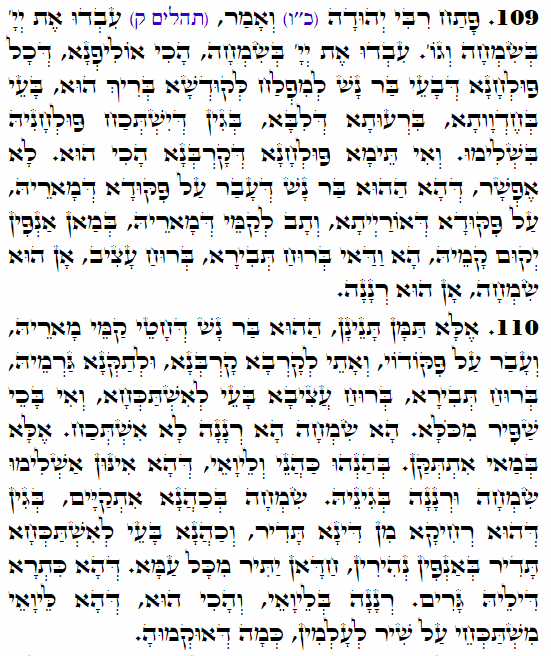Daily Zohar # 3596 – Vayikra – Come with happiness and singing
Hebrew translation:
110. אֶלָּא שָׁם שָׁנִינוּ, אוֹתוֹ אָדָם שֶׁחוֹטֵא לִפְנֵי רִבּוֹנוֹ וְעָבַר עַל מִצְווֹתָיו, וּבָא לְהַקְרִיב קָרְבָּן וּלְתַקֵּן אֶת עַצְמוֹ בְּרוּחַ שְׁבוּרָה, צָרִיךְ לְהִמָּצֵא בְּרוּחַ עֲצוּבָה. וְאִם הוּא בּוֹכֶה, זֶה יָפֶה מֵהַכֹּל. הֲרֵי שִׂמְחָה וַהֲרֵי רְנָנָה אֵין נִמְצָאִים. אֶלָּא בַּמֶּה מִתְתַּקֵּן? בְּאוֹתָם כֹּהֲנִים וּלְוִיִּם, שֶׁהֲרֵי הֵם מַשְׁלִימִים שִׂמְחָה וּרְנָנָה בִּשְׁבִילוֹ. הַשִּׂמְחָה מִתְקַיֶּמֶת בְּכֹהֵן, מִשּׁוּם שֶׁהוּא תָמִיד רָחוֹק מִן הַדִּין, וְהַכֹּהֲנִים צְרִיכִים תָּמִיד לְהִמָּצֵא בְּפָנִים מְאִירוֹת, שְׂמֵחִים יוֹתֵר מִכָּל הָעָם, שֶׁהֲרֵי הַכֶּתֶר שֶׁלּוֹ גּוֹרֵם הָרְנָנָה בַּלְוִיִּם, וְכָךְ זֶה, שֶׁהֲרֵי הַלְוִיִּם נִמְצָאִים תָּמִיד עַל הַשִּׁיר, כְּמוֹ שֶׁבֵּאֲרוּהָ.
.
Tap here to check the studies and tools for Pesach
Zohar Vayikra
#109
Psalms 100:2
“עִבְדוּ אֶת יְהוָה בְּשִׂמְחָה בֹּאוּ לְפָנָיו בִּרְנָנָה.”
“Serve YHVH with happiness; Come before His presence with singing.”
Rabbi Yehuda quotes the verse above and says that we learned that our work in serving Hashem should come from the heart with happiness and joy to be a complete action. Now when we bring offerings to the temple, it pays and cleanses our sins. In such a case, how can a person come happy with his offerings? He is supposed to be sad with a broken heart after he went against the commandments of his master. Where is the happiness and singing, as the verse suggests?
#110
He answers that a person that sinned and came with a sacrifice to the priest to correct himself needs to come with a broken spirit, and sadness. If he cries it’s even better. The Happiness and singing are completed by the priests and the Levites that make the corrections for him.
The happiness comes from the priest that needs to have a shining face and express joy more than any other person because he is always far from judgment. The singing comes from the Levites that were always singing in the Holy Temple.
Lesson;
Every positive action we do should be with appreciation to God that we were given the opportunity and appreciation that we can do it. We earn merits on every positive action we do.
When we do negative actions, we lose Light to the negative side and we need to make corrections. If it was done by hurting another person or group we ask forgiveness and compensate them in any way that would clear the sin from our ‘book’. When we cannot connect with those we hurt to ask for forgiveness, or that the act was just against the ways of the Torah, then we need to feel sad and regret our action for losing the Light. We compensate by giving from ourselves. We commit to study more than our regular scheduled times to reveal more light and restore what we lost. Fasting is another form of giving from ourselves because our negative actions affect the blood that carries the soul levels of Nefesh. Fasting helps in removing negative elements from the blood and together with a commitment not to repeat the bad, we earn good. In addition to the above, giving Tzedakah to correct sins has the aspect of crying. It is like paying penalties for bad deeds. At the same time, it’s the best expression of repentance because it’s not easy to give money.
When you give Tzedakah, even if it not for a specific correction, it’s good to meditate that the Tzedakah you give is to cleanse any bad deeds from this life or previous lives.
Reading for the first day of Nisan
{||}

 Previous: Vayikra
Previous: Vayikra


